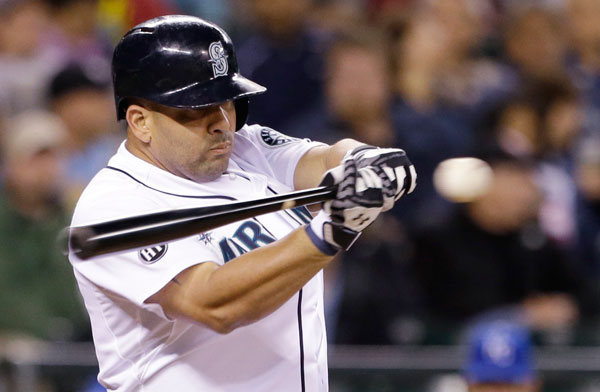Kendrys Morales and Seattle Mariners reunited for some reason

The Mariners traded for Kendrys Morales today, adding a switch hitting back of some quality to a roster that is sorely in need of offensive talent, and that is disproportionately left-handed. Morales is a career 114 wRC+ hitter, and a switch hitter, but one who hits much better from the left side, owning a 121 wRC+ against righties from the left side compared to a 95 wRC+ against lefties from the right side.
This trade is most notable not really because of Morales’ production relative to the league from either side of the plate, but because Morales has now become a Mariner twice against his will. He’s also only barely a month removed from willfully opting not to join a Mariners team pursuing his services. Morales once reportedly turned down a three-year, $30 million contract offer from the Mariners, as well as a qualifying offer in the offseason which made him a free agent, and then an offer or at least palpable interest from the team in June. Nonetheless, Morales yet again will don a Mariners jersey.
To get Morales back the Mariners gave up Stephen Pryor. You may remember Pryor as a flame throwing reliever who was dominant in stunning fashion in brief action at the beginning of last season. Back then he was touching the upper-90s with his fastball, but a torn lat muscle followed by a triceps injury had him throwing in the mid-80s last year. His average fastball velocity has climbed back up to the low-90s, and he’s only 25, but to a degree the Mariners have traded a broken reliever for Morales.
Of course, Morales is still Morales. The reason we didn’t hear much about the Mariners interest in him after the Twins signed him is probably because they have little reason to scout him. They had him for a full season. They probably watched him at Scott Boras’ goofy training center. The Mariners and their front office know the hell out Kendrys Morales.
For the Mariners, the trade is probably going to receive more attention than it will have impact on the field. The Mariners have been pretty dreadful at the DH and first base positions for the past couple years. While Morales is projected for about replacement level to a half-win the rest of the season, that’s actually a decent improvement over what the Mariners have trotted out at first base and DH this year. Corey Hart, Justin Smoak, and Logan Morrison have combined for more than a full negative-win this season.
For the Twins, this is something. They aren’t making the playoffs this year, and didn’t stand to retain any value from Morales in offseason. Because the Twins signed him midseason to a one year contract, they wouldn’t have been able to offer Morales a qualifying offer tied to compensation. Morales hasn’t been very good since joining the Twins, so this is probably the best haul the Twins could have hoped for. If Pryor returns to the form he showed in early 2013, he’s got potential to be a dominant closer. There’s little material evidence to suggest that he’ll return to that form physically, or that the kind of production he posted was anything close to his true talent level to begin with.
For Morales, this year sucks pretty bad. He went into the 2014 offseason looking to sign a long-term deal, and ended up settling for a one-year deal with a bad team. A slow start, and a trade from one pitcher’s park to another has likely limited Morales’ offseason value considerably. He’ll go into next offseason a year older, and with potentially crappy production as the most recent employment history on his resume. While the Mariners had a lot of leverage in the 2014 offseason due to the compensation tied to the qualifying offer that Morales declined, they may have leverage going into 2015 because they could be the only team that has interest in Morales, no matter how ill-formulated that interest is.
For the Mariners, the best part of this trade is what the trade wasn’t. They didn’t unload a bunch of prospects or commit a bunch of long-term dollars to acquire Morales. He won’t block D.J. Peterson, and he won’t be playing awful outfield defense. If all goes well, his presence on the roster won’t even require entice the Mariners to give Logan Morrison or Corey Hart any time in the outfield.
For me, this deal is a lot like the signing that brought Willie Bloomquist back. Trading for Morales is flawed at its core, and terribly inefficient. If the Mariners believed that Morales could have led them to more victories overall, they probably should have been in on him in the offseason. Then they’d have gotten him after a full spring training, and have benefited from his talent earlier in the season, when the wins count the same as the end of the season.
Unless they thought that Justin Smoak and Logan Morrison were the answer to any question that’s ever existed, which is yet another flaw. The resources used to bring Morales back, both in terms of talent and payroll, are not enough to doom the Mariners. They’ve insulated themselves from long-term doom while potentially adding a useful piece.
This isn’t the most exciting way to add value, and it isn’t the smartest way. But it sacrifices almost none of the future, which is good for a team that should be at the beginning of its win curve. Kendrys Morales is still Kendrys Morales, and the Mariners are still the Mariners, and now they’re reunited, probably to Morales’ chagrin.



